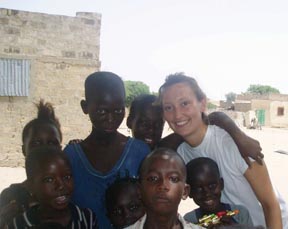Now you're cooking -- with sunlight: Engineering student pioneers solar ovens for impoverished nations
By Thomas Oberst

In June, Cornell senior Cyprienne Crowley traveled to the rural village of Méckhé, Senegal, to meet Abdoulaye Touré, the nation's leading expert on solar ovens. By the end of her visit, her host's two wives had asked Crowley if she would stay and be Touré's third wife.
Crowley, a 21-year-old mechanical engineering student from Queens, N.Y., declined the invitation.
Her visit to Méckhé was part of a 10-week stay in Senegal during which Crowley hoped to help design and produce a new generation of affordable solar ovens for the impoverished country. She volunteered for the assignment through Engineers for a Sustainable World's (ESW) Summer Engineering Experience Development (SEED) program. Based at Cornell, ESW is a nonprofit organization that mobilizes scientists and engineers to seek solutions for global poverty.
Throughout Senegal, women cook on outdoor stoves over wood or charcoal fires. However, overuse of wood fuel and bush fires caused by the stoves themselves have led to widespread deforestation. The resulting deterioration of soil quality has caused the Sahara desert to creep slowly southward, consuming the once lively Senegalese savannah.
But Crowley thinks the Senegalese need only look upward for help.
With a device known as the solar oven, Senegalese can cook using energy entirely from sunlight. The ovens use large reflective panels to direct solar radiation into a glass-topped box. The inner walls of the box, made of aluminum and painted black, absorb the sunlight and re-emit it as heat energy that can cook food placed inside. It is the same process that heats the inside of a car with closed windows parked in direct sunlight.
Touré understands deeply the unsustainability of wood fuel. It is why he has devoted the past 20 years to the widespread use of solar ovens across Africa.
Combining ideas from three previous solar cookers built by nongovernmental organizations, Touré engineered his own line of solar ovens that includes an adjustment rod for increasing or decreasing the angle of the reflective panels to maximize power as the sun moves across the sky and small mirrors on the panels that act as guides for choosing the best angle.
When Crowley met Touré, he filled her in on the latest prototype of solar ovens initiated by SEED volunteers from the previous summer. Made from recycled roto-molded plastic and insulated with cotton and peanut shells, the prototype featured two reflective panels instead of one, added insulation, a lid that slides rather than hinges to minimize heat loss when the door is opened and even ergonomic handles.
Armed with $4,000 she had raised from Cornell engineering alumni and ESW, Crowley set out to finish the prototype and organize a plan for mass-producing the ovens to ensure their availability to the Senegalese. She also planned to improve the oven's efficiency.
CRESP Senegal, an independent affiliate of Cornell's Center for Religion, Ethics and Social Policy, provided Crowley with a base just north of Senegal's capital, Dakar, and a Dakar university gave her access to a machine shop and material testing facilities.
Despite frequent power outages, Crowley was nearing completion of the prototype by the end of her 10 weeks and successfully conducted tests with oven temperatures reaching 257 degrees Fahrenheit. She also made sure the prototype could cook her favorite Senegalese dish, chicken yassa, in under two hours.
Touré was very pleased that the use of local recycled materials lowered the price tag of the oven to $80 from $100, since he had previously identified cost as the greatest obstacle to the widespread use of solar ovens in Senegal, where the average per capita income is about $670.
A SEED volunteer from Ohio State University continued tests of the prototype after Crowley left. Mass production plans will be in the hands of next summer's SEED volunteers.
Other student projects:
Roslyn Odum, 22, of Seattle, Wash., returned to Honduras this summer as a SEED volunteer to finish construction on the water treatment plant (read the story) she had helped start during spring break.
After a summer full of crash courses on concrete reinforcement, sealants and local culture, Odum conducted final tests that show the plant is 95 percent efficient. "It was the best we had hoped for," said Odum, who noted that the $14,000 price of the plant will be even less for future plants in other underdeveloped areas, now that the prototype is complete.
Odum received her B.S. degree in environmental engineering from Cornell in May and is starting work on a master's degree here in engineering with a focus on rural water supply. She will return to Honduras in January with the next team of ESW volunteers to monitor the plant and visit villagers she befriended.
Brett Gleitsmann, M.S. '05, of Incline Village, Nev., spent 10 weeks this summer in Hyderabad, India, assessing the spatial and temporal variability of climate, land use and crop yield in the Krishna River basin. He hopes his work will impact local water management policy by maximizing the river's productivity. Gleitsmann, 31, who did most of his work from a computer laboratory at the International Crops Research Institute for the Semi-Arid Tropics in Patancheru, also studied the importance of irrigated agriculture for livestock, a topic often overlooked in river studies.
Gleitsmann is beginning doctoral work in water resource management at Cornell this fall.
Thomas Oberst is a student writer intern at the Cornell News Service.
Media Contact
Get Cornell news delivered right to your inbox.
Subscribe